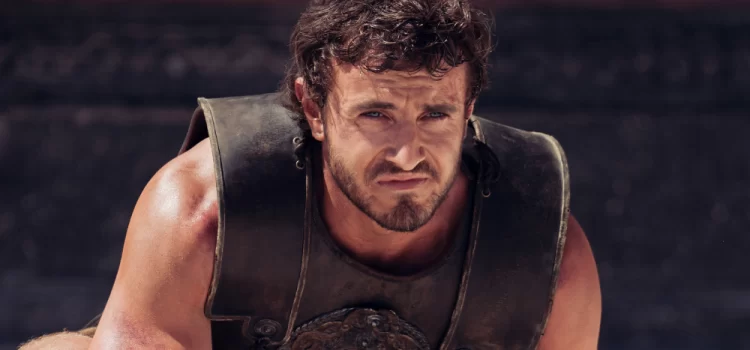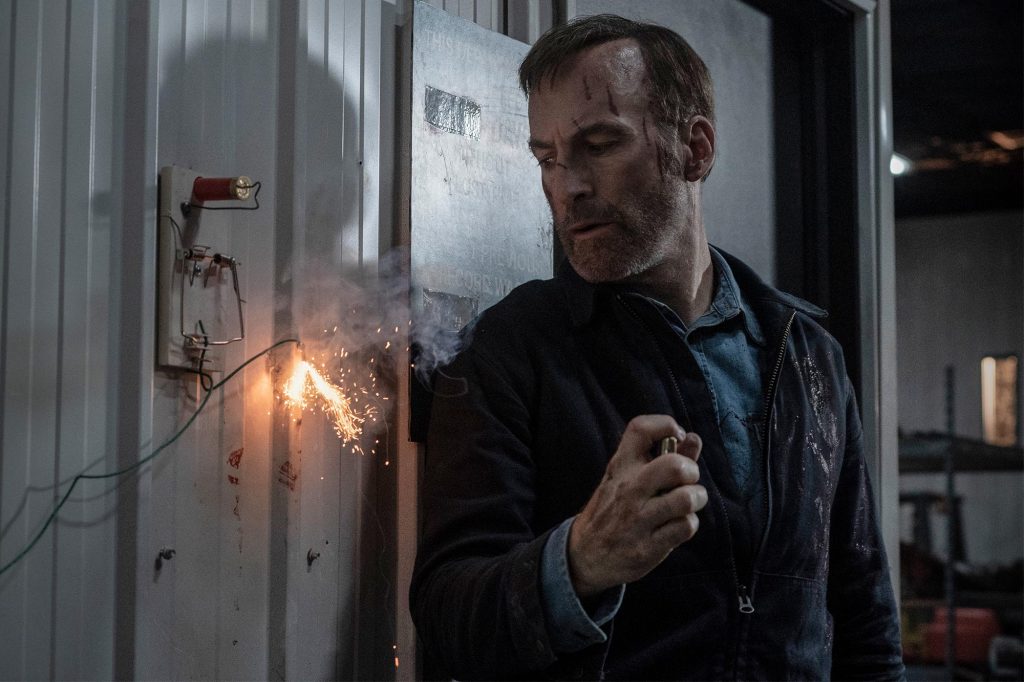By Alex McPherson
Lacking the focus and heart of its predecessor, director Ridley Scott’s “Gladiator II” undercuts its splatter-filled action sequences and on-point performance from Denzel Washington with a jumbled narrative that’s content to live in the shadow of greatness.
Scott’s sequel takes place takes place 16 years after the events of “Gladiator,” which concluded with the deaths of Maximus (Russell Crowe — the Roman general-turned-revenge-fueled-gladiator-turned potential “savior” of Rome — and the beady-eyed Emperor Commodus (Joaquin Phoenix), a tyrant who assumed power after killing his father and former emperor, the wise Marcus Aurelius (Richard Harris).
The “Dream of Rome” to establish a true republic, which motivated Maximus and his supporters, has seemingly been extinguished, and chaos reigns once again among the populace. Rome is controlled by two pasty, unhinged brothers — co-emperors Geta (Joseph Quinn) and Caracalla (Fred Hechinger), with a monkey on his shoulder — who seek wealth and violent conquest above all else.
They order the Roman army, led by the increasingly disillusioned General Marcus Acacius (Pedro Pascal), who is married to Marcus Aurelius’s daughter Lucilla (Connie Nielsen), to conquer as much new territory as possible, as violently as possible.

Lucius (Paul Mescal), Lucilla’s son, is living humbly as a farmer in the North African colony of Numidia with his wife, Arishat (Yuval Gonen). They were forced to flee Rome after Maximus’s death. But Lucius, all grown up and using the nickname “Hanno,” cannot escape his Roman past.
Acacius and his troops show up and ransack the city — killing Arishat and taking Lucius back to Rome as a prisoner. The stage is set, like Maximus before him, for a tale of revenge, and Lucius (fittingly angry) is bloodthirsty to avenge his wife.
Also like Maximus before him, Lucius is quite a capable fighter. He impresses the conniving, calculating slave trader Macrinus (Washington), who takes Lucius under his wing as a gladiator and promises to grant him an opportunity to kill Acacius if he wins enough fights.
The ever-manipulative Macrinus, who was also once a gladiator himself, plots his own ascendancy through Roman royalty, as Lucius fights his way through the coliseum, and Acacius prepares to rebel against the parasitic rascals in command. The stage is set for plenty of drama and political intrigue, complete with hyperviolent set-pieces galore and numerous hunks in kilts.
It’s a continuation of “Gladiator,” all right, and Scott delivers the basics of what fans of swords-and-sandals epics expect. What’s lacking this time around, though, is a clear emotional throughline — a focused narrative of one man’s quest for vengeance and eventual unity of a fractured society.

By awkwardly stitching its subplots together, “Gladiator II” has neither the pacing nor strong characterization of Maximus’s story, sapping momentum while hitting familiar plot beats and offering only glimmers of greatness amid its nostalgia-laden framework.
Most of these involve Washington, who embodies Scott’s commentary on “playing the system” with a mixture of camp and fearsome excitement that’s sorely lacking elsewhere.
Lucius isn’t as compelling a hero as Maximus, and Mescal’s characteristic talent for subtlety is poorly realized here. David Scarpa’s uneven screenplay gives Mescal plenty of chances for impassioned speechifying and opportunities to look angry, but Mescal lacks Crowe’s charisma and gravitas, worsened by the all-too-familiar setup for Lucius’s story that “Gladiator” fans (or anyone familiar with the revenge genre) have seen done before, and done better. A questionable accent certainly doesn’t help.
Still, Mescal certainly has a “Movie Star” look, if not the screen presence of Crowe, who conveyed an enduring compassion despite Maximus’s burning desire for revenge. Mescal is muted and bland by comparison, a talented actor playing against his strengths as a performer.

Pascal doesn’t leave much of an impression either, essentially filling in the aspects of Maximus’s character that Lucius lacks. He’s a victim of the film’s narrative structure that jarringly cuts between several subplots, seemingly unsure of what’s worth focusing on narratively and tonally.
Acacius is relegated to sequences laden with exposition that carry little impact, weighing his love for Lucilla (Nielsen is typically radiant but saddled with much of the screenplay’s blunt dialogue) and the Dream of Rome with his official responsibilities.
These sequences feel workmanlike via Scott’s scattered direction that, more generally, abandons the classical feel of the first film and undercuts its typically excellent period detail (with strong production and costume design) with the goal of moving the plot along, rather than immersing viewers in the drama itself.
What “Gladiator II” does have, at least sporadically, are crowd-pleasing scenes of brutal violence and backstabbing politics, elevated by the always-excellent Washington.
Indeed, Macrinus — fiendish, verbose, and menacing (possessing viciousness beneath smiles and “playful” banter) — gives Scott’s film a much needed burst of energy. Washington is clearly enjoying himself, taking big swings in an ensemble that otherwise plays it safe.
Macrinus is always thinking three steps ahead — playing the system from the inside, casting aside any and all compassion for those caught in the crossfire.

It’s alternately funny and shocking to watch what he and Washington have up their sleeves — Washington brings a sense of volatility that commands his every scene, and Macrinus’s backstory is layered enough to shoulder the entire movie on his own (but that would have meant relinquishing the “nostalgia factor” that this sequel depends on).
The action set-pieces, too — with savage swordplay and CGI animals galore, including baboons, rhinos, and sharks (?!) — are always fun to watch: loud and chaotic in the best ways. There’s still something lost in the film’s visual effects, an immediacy that the scrappy battles from the first “Gladiator” had in spades.
These sequences, and those of Macrinus’s machinations (with Quinn and Hechinger being suitably repugnant beside him), are where “Gladiator II” ascends beyond mediocrity — leaning into enjoyable craziness rather than humorless moralizing.
Like Scott’s tonally erratic “House of Gucci” before it, “Gladiator II” can’t balance its more satirical flourishes (mostly involving Macrinus) with the earnest drama of Lucius’s quest for revenge and eventual redemption of Rome.
It comes across as confused and scattered, reliant on blatant callbacks and rehashed emotions, ultimately swapping its relevant political commentary with shrug-worthy simplifying.
There’s still enough pure spectacle in “Gladiator II” to engage on the surface level. Am I fully “entertained,” however? Not quite.

“Gladiator II” is a 2024 action period drama directed by Ridley Scott and starring Paul Mescal, Denzel Washington, Pedro Pascal, Joseph Quinn, Fred Hechinger and Connie Nielsen. It is rated R for strong bloody violence and its runtime is 2 hours, 28 minutes. It opened in theaters Nov. 22. Alex’s Grade: C+
Alex McPherson is an unabashed pop culture nerd and a member of the St. Louis Film Critics Association.




